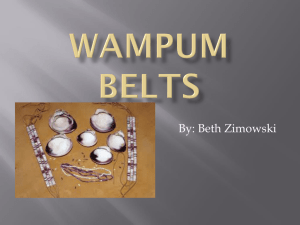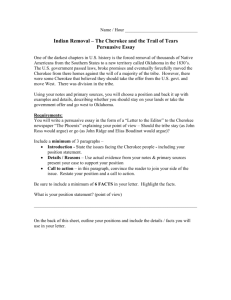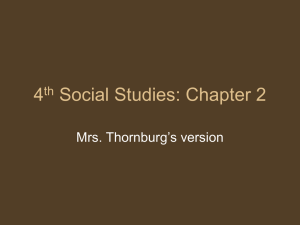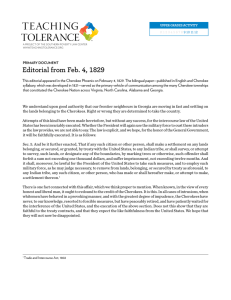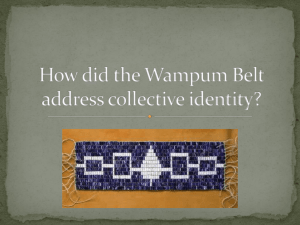Art as National Literature - Western Carolina University
advertisement
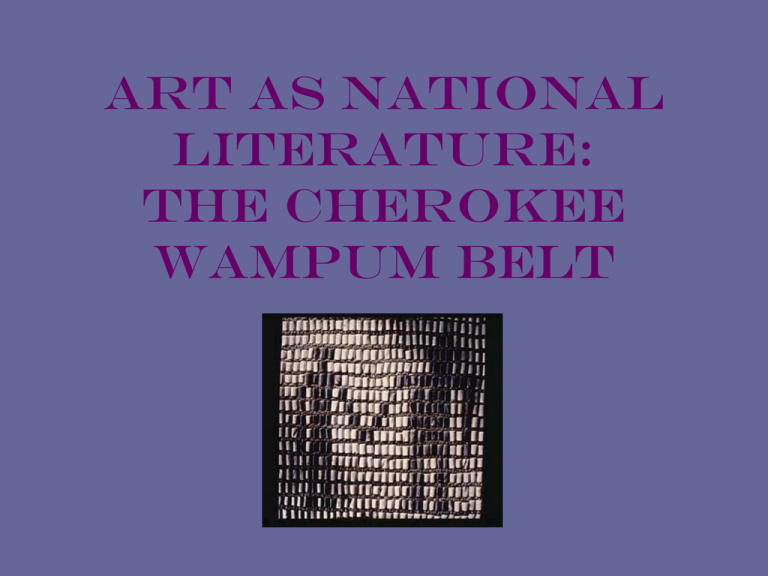
Art as National Literature: The Cherokee Wampum Belt The color white and the Cherokee • White is a universal symbol of peace • The traditional peace-pipe was made of white stone • The word for white is often found in sacred formulas to mean peace and happiness • In the Green Corn Dance, people are invited to come along the “white path” and enter the “white house of peace” to partake of the new “white food” (Mooney, 494) What is Wampum? • Wampum is an Algonquian word that translates roughly to white shell beads. • Historical wampum are small, cylindrical, white and purple beads. • Historical wampum beads were used for decoration and for trade by natives living in the coastal New England region where the shells used for making the beads were found. • In the early 1600s European traders and settlers began to use wampum beads as money. The shells replaced European currency which required gold and silver not readily available in “the New World”. Trade and Negotiation: Wampum and the Cherokee • The use of wampum as currency was spread through the fur trade to the Iroquois in the northeast and the Creek and Cherokee in the southeast. • The word for money in Cherokee is atela/atsela/adela (dialectic differences). This is also the word used for bead (Mooney, 488). • Wampum was instrumental in diplomatic affairs. Native confederacies, such as the Iroquois, the Creek, the Cherokee, exchanged strings or belts of wampum to solidify negotiations. • When Cherokee men visited other tribes such as the Iroquois, they often took wampum belts made by Cherokee women as a gift (and sign of peace) for the Iroquoian women (Perdue, 93). Cherokee Lawgiver by Cecil Dick Courtesy of Rennard Strickland “In towns of the Cherokee confederacy people gathered annually to hear the tribal orator, a priest who was sometimes called "the beloved man" recite the common law of the confederacy. "When the orator spoke the law, he was reading the meaning of history and tradition contained in the tribal wampum. He held the ancient and sacred wampum belts in his hand" (Strickland, 11). How do wampum belts function as material rhetoric? • Wampum belts continues to be used as mnemonic devices, legal documents, and historical communicative devices. • Each belt signifies a particular event. The beads convey a speaker’s words and can be translated for a particular meaning. How do belts communicate? • The meaning of the belt must be publicly performed in order for its message to be properly disseminated. • Used outside an official cultural event, negates the validity of a belt’s message. Keetoowah (Nighthawk) Society members with the historic wampum of the Cherokees near Gore, Oklahoma, in 1916. Courtesy of the Oklahoma Historical Society Transition to Writing • By 1808 Cherokees were able to use Sequoyah’s method of writing in syllabary to translate their laws into a written and readable language. • “In the ninety years between the adoption of the first written law (l808) and the abolition of tribal courts (1898) wampum was supplanted by more than a million pages of legal transcripts and printed material. By 1896 the Redbird Smith-Keetoowah movement of the Cherokees acknowledged that understanding of the wampum had been lost, and recovery of these ancient laws became one of the cornerstones of [traditionalist] revival" (Strickland, 103). Citations for Power Point and Lesson Plan • • • • • • • • • Sources: Duncan, Barbara. Living Stories of the Cherokee. Chapel Hill, NC: The University of North Carolina Press, 1998. Mooney, James. Cherokee History, Myths and Sacred Formulas. Cherokee, NC: Cherokee Publications, 2006. Perdue, Theda. Cherokee Women. Lincoln, NE: The University of Nebraska Press, 1998. Strickland, Rennard. Fire and the Spirits: Cherokee Law from Clan to Court. Norman, OK: The University of Oklahoma Press, 1982. Websites: http://craftrevival.wcu.edu/ http://english.ttu.edu/KAIROS/3.1/features/smith/episodes/1789/comments/ Cher/wampum.html http://www.history.org/Foundation/journal/Summer07/counterfeit.cfm
